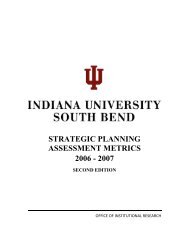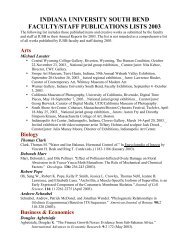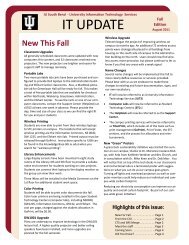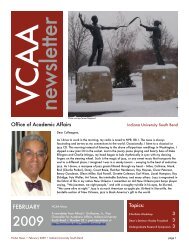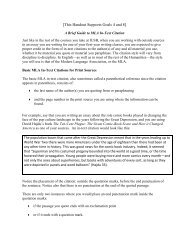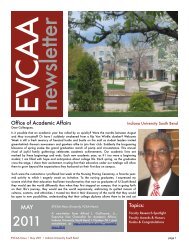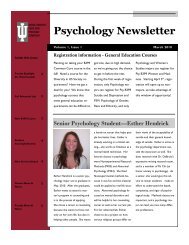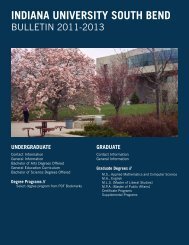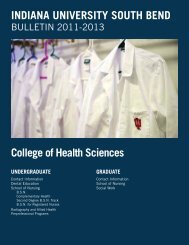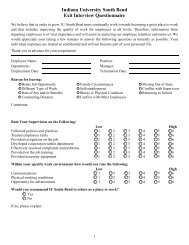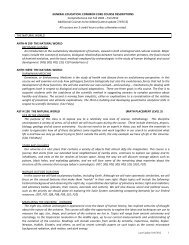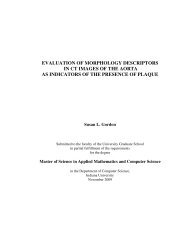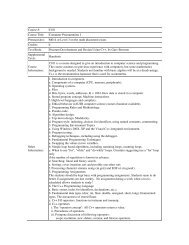School of Business and Economics | Indiana University South Bend
School of Business and Economics | Indiana University South Bend
School of Business and Economics | Indiana University South Bend
You also want an ePaper? Increase the reach of your titles
YUMPU automatically turns print PDFs into web optimized ePapers that Google loves.
L e a d i n g i n t h e 2 1 s t c e n t u r y<br />
fortune journalist recounts biggest business collapse in history<br />
In late March, the Enron trial was weeks away from completion<br />
in the Houston courtroom. The court proceedings <strong>and</strong><br />
the media attention had made Jeffrey Skilling <strong>and</strong> Kenneth<br />
Lay the poster boys for excess <strong>and</strong> greed, <strong>and</strong> Enron was the<br />
punch line in numerous jokes.<br />
Amid the hoopla <strong>of</strong> the case that examined the biggest<br />
business collapse in history, Fortune Magazine’s senior writer<br />
Bethany McLean spoke to students, faculty, <strong>and</strong> supporters<br />
during the annual Leading in the 21st Century Speakers Series <strong>of</strong><br />
the <strong>School</strong> <strong>of</strong> <strong>Business</strong> <strong>and</strong> <strong>Economics</strong>.<br />
McLean co-authored The Smartest Guys in the Room. The<br />
book has been made into a documentary that was honored<br />
with an Academy Award nomination.<br />
She first wrote about Enron in 2001 for Fortune. Her article,<br />
“Is Enron Overpriced?” was the first in a national publication<br />
to question the company’s financial path. The Houstonbased<br />
energy company grew rapidly <strong>and</strong> then collapsed in<br />
late 2001.<br />
However, she insists she didn’t break the story, she only<br />
checked the financial statements <strong>and</strong> wrote a skeptical article<br />
about the value <strong>of</strong> the stocks at the time, which was $75 a<br />
share. “I think I raised an early warning sign,” she said.<br />
Before journalism, she worked as an investment banking<br />
analyst on Wall Street until 1995 when she joined Fortune as<br />
a fact checker. With her degree in mathematics <strong>and</strong> English,<br />
she was a good fit to verify balance sheets <strong>and</strong> compound<br />
annual growth rate. Fortune gave her the opportunity to<br />
write when she approached the editors with story ideas.<br />
McLean said Enron was a complicated case. “When you try<br />
to prove where the fraud was, it becomes very tricky.” The<br />
economics <strong>of</strong> the firm were far from reality <strong>and</strong> the accountants<br />
<strong>and</strong> lawyers signed <strong>of</strong>f on a lot <strong>of</strong> what was done. “It<br />
is a case <strong>of</strong> everyone failing to do the right thing” along with<br />
a healthy dose <strong>of</strong> greed <strong>and</strong> self-delusion.<br />
McLean’s lecture was part <strong>of</strong> the Leading in the 21st Century<br />
Speaker Series <strong>and</strong> was funded with the support <strong>of</strong> Northwestern<br />
Mutual Financial Network, Tuesley <strong>and</strong> Hall<br />
Attorneys, St. Joseph Capital Bank, Metzger, Mancini<br />
<strong>and</strong> Lachner, CPAs, <strong>and</strong> State Wide Aluminum.<br />
8 | i u s o u t h b e n d s c h o o l o f b u s i n e s s & e c o n o m i c s | 2 0 0 6 a n n u a l r e v i e w



